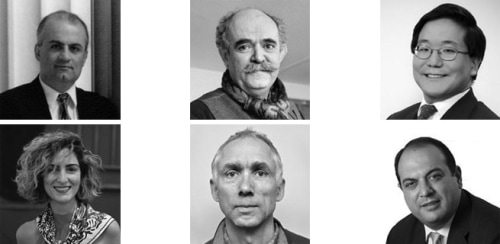
Atassi Foundation Announces Inaugural Advisory Committee
We are excited to announce the formation of the Atassi Foundation Advisory Committee. Created to support the Foundation’s vision for the promotion and preservation of Syrian modern and contemporary art, its purpose is to bring together experts in different fields to pool their various areas of knowledge and insight.
Each committee member will serve for two years, and act as brand ambassadors for the Foundation as well providing their input on a wide range of initiatives.
The full list of inaugural Atassi Foundation Advisory Committee members is as follows:
Henry Kim, CEO Aga Khan Museum (Toronto, Canada)
Director and CEO of the Aga Khan Museum in Toronto, Henry Kim is focused on promoting cross-cultural exchange, and economic and educational empowerment through art. Prior to joining the Aga Khan Museum, Kim was Project Director at the prestigious Ashmolean Museum in Oxford for four years, following nearly two decades at the University of Oxford as a lecturer and curator.
Eckhard Thiemann, Artistic Director, Shubbak Festival (London, UK)
An independent curator, programmer and arts manager, Eckhard Thiemann specialises in contemporary Arab culture, dance and international cultural programming and exchanges. In addition to his role at Shubbak, London’s largest festival of Arab culture, he is also Programming Associate for dance at The Lowry, one of the UK’s largest arts centres.
Georges Makhoul, CEO, Constellation Holdings (Dubai, UAE)
In his capacity at Constellation Holdings, a Dubai-based private investment firm, Georges Makhoul works across diverse industries, including energy, hospitality, aviation, real estate and finance. Prior to this, he was President of Morgan Stanley in the Middle East and North Africa. An avid art collector, he is also on the boards of several companies.
Ziad Dalloul, Artist (Paris, France)
The Soueida-born artist has lived and worked in the French capital since 1984. One of Syria’s best-known artists internationally, Ziad Dalloul has exhibited around the world, and his work can be found in major public collections including those of the British Museum, Institut du Monde Arab, Khaled Shoman Foundation, Atassi Foundation and more.
Dr Nasser Rabbat, Professor and Director, Aga Khan Programme for Islamic Architecture, MIT (Cambridge, MA, USA)
The author of several books, including, most recently, The Destruction of Cultural Heritage: From Napoléon to ISIS (2016, co-edited with Pamela Karimi), Dr Nasser Rabbat contributes regularly to Arabic newspapers and consults with international design firms on projects in the Islamic World. He is also Director of the Aga Khan Program for Islamic Architecture at MIT, and his interests include the history and historiography of Islamic architecture, medieval urbanism, modern Arab history, contemporary Arab art as well as post-colonial criticism. A book on the Dead Cities in Syria is slated for publication in 2018.
Yasmin Atassi, Director, Green Art Gallery (Dubai, UAE)
As Director of one of Dubai’s oldest art galleries, Yasmin Atassi oversees a roster of artists working across diverse media, whose practices are rigorously researched, idea-led, and representative of our current moment. Green Art Gallery now represents a multi-generational mix of artists from the Middle East, North Africa, South Asia and beyond, including Turkish artists Hale Tenger and Hera Büyüktasciyan; Iranian artists Kamrooz Aram and Nazgol Ansarinia; and Shadi Habib Allah, Seher Shah, and Alessandro Balteo Yazbeck.
MASA Begins Digitization Project
The Modern Art Syria Archive (MASA) has welcomed Dr Anneka Lenssen as an advisor to our research consortium also comprising Professor Silvia Naef of the University of Geneva and artist Nagham Hodaifa. Dr Lenssen specialises in Global Modern Art at UC Berkeley's Department of Art History and brings with her valuable experience and knowledge on Syrian art, which was also the subject of her doctorate.
The MASA team has started working on the digitisation process of available materials. It is hoped that some few thousand items – including artworks, newspaper clippings and exhibition collateral – will be scanned, digitised and ready to view by the end of 2019.
Other Reading
We were delighted to recently share a new short essay written by curator Shulamit Bruckstein on Ali Kaaf’s solo exhibition, Die Byzantinische Ecke ('the Byzantine Corner') which ran at C&K Gallery in Berlin from 21 April–26 May 2018. You can read it in both English and Arabic.
We are happy to receive other reviews of shows by Syrian artist. Do share them with us by contacting shireen@atassifoundation.com